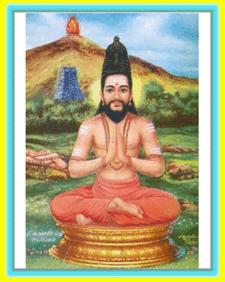- Arunagirinathar
-
Saint Arunagirinathar 
Saint ArunagirinatharBorn 15th Century A.D.
Thiruvannamalai
Tamil Nadu
IndiaTitles/honours Tamil Poet Philosophy Saivism Literary works Tiruppugazh Arunagirinathar was Tamil poet who lived during the 15th century in Tamil Nadu, India. He was the creator of Tiruppugazh, a book of poems in Tamil in praise of the Hindu God Murugan. He was a member of the Isai Vellalar community.[citation needed]
The Thiruppugazh composed by him, consisted of 16,000 songs, of which only about 1,365 has been traced. His poems are known for their lyricism coupled with complex rhymes and rhythmic structures. In Thiruppugazh, the literature and devotion has been blended harmoniously. [1]
Thiruppugazh is considered[by whom?] as one of the major works of mediaeval Tamil literature, both for its poetical and musical qualities, and for its religious, moral and philosophical content.
Contents
Early life
Arunagiri was born in Thiruvannamalai, a town in Tamil Nadu. His father died soon after his birth and his mother and sister instilled him with their cultural and religious traditions. Legends claim that Arunagiri was attracted to the pleasures of the flesh and spent his youth in pursuing a life of debauchery. His sister always gave whatever she earned to make her brother happy, and he frequented devadasis. There came a time when his sister had no money to meet his demands. She said that he should sell her in order to have money, upon hearing which Arunagirinathar realised how selfish he had been. He decided to end his life, went to a temple and hit his head against the pillars and steps, begging for forgiveness. Then he leapt from the temple tower. He was however miraculously saved from the death by the god Muruga who transformed him into a saint.[2][3]
Arunagiri sang his first devotional song and thereafter decided to spend the rest of his life singing in praise of the God. He was a devotee of Muruga and worshipped him at Vedapureeswarar temple at the sacred place known as Cheyyar.
His fame got the jealousy of chief minister of the Kingdom. He claimed Arunagirinathar as a false saint and not a true devotee of the god Subramaniya. So the king arranged a public gathering and asked Arunagiri to show Subramanya to others also. Arunagiri started singing songs towards Muruga and soon after Muruga appeared in a stone pillar in the form of child.
Songs
Main article: TiruppugazhArunagiri, rendered his first song Muthai Tharu after the miraculous escape at Thiruvannamalai. Arunagiri visited temples all over South India and composed 16000 songs - about 2000 alone remained in this earth. The songs show the way to the life of virtue and righteousness and set the tone for a new form of worship, the musical worship.[4]
The other works of Arunagirinathar include Thiruvaguppu, Kandar Alankaram, Kandar Anubhuti, Kandar Andhadi, Vel Viruttam, Mayil Viruttam and Seval Viruttam. For Muruga devotees Thiruppugazh is equivalent to Thevaram, Kandar Alankaram is equivalent to Thiruvasagam and Kandar Anubhuti is equivalent to Thirumandiram.
Retrieval
The Thiruppugazh songs remained in manuscript form for a number of years and ignored and forgotten. V.T. Subramania Pillai and his son V.S. Chengalvaraya Pillai of Tiruthani understood their value, retrieved them and published them.
In 1871 Subramania Pillai, a District Munsif, had the opportunity to hear a rendering of a Tiruppugazh song while he was on a tour of Chidambaram. Captivated by the song, he decided to set out on a mission to search for the entire body of Tiruppugazh songs. He toured all over south India, collected manuscripts, including palm leaves, assembled the texts and published them in two volumes, the first in 1894 and the second in 1901. After his demise, his son Chengalvaraya Pillai brought out a new edition of the songs.
He also went to so many shrines sucha as shiva tempel and Muruga temples amongst Melakadambur is one of them he wrote a song about this shrine's lord Muruga "kaviri seerumon seeraru soozh kadambooril"-means Muruga is blessing us from the place where the tributary of the river Cauvery is the vadavaru the kadambur lies in the banks of the vadavaru
See also
- Thiruvannamalai
- Kandar Anuboothy
Notes
- ^ "Thiruppugazh — musical way of worship". The Hindu (India). 11 July 2003. http://www.hindu.com/thehindu/fr/2003/07/11/stories/2003071101270600.htm. Retrieved 31 October 2011.
- ^ "Excess indulgence will result in pain". The Hindu (India). 14 November 2002. http://hindu.com/2002/11/14/stories/2002111400900900.htm. Retrieved 31 October 2011.
- ^ Arunagirinathar
- ^ Arunagirinathar
References
Categories:- Indian songwriters
- Hindu religious figures
- Tamil poets
- Tamil people
Wikimedia Foundation. 2010.
